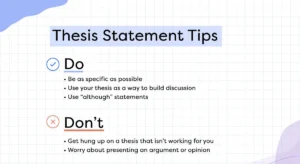Welcome to the world of academic writing made easy! Have you ever felt confused by all the words when trying to put your thoughts on paper? You’re not alone. Creating a strong thesis statement is like having a helpful guide on this writing journey. It’s a tool that helps you and your readers understand your essay or research paper.
In this guide, we’ll break down the process of making a thesis statement in simple terms. We’ll explain what a thesis statement is and why it matters. Most importantly, we’ll give you practical steps to create a thesis statement that your professors will like and that will improve your writing skills. So, let’s start this journey, and your new knowledge will be like a map to make your writing journey easier.
What Is a Thesis Statement? 
A thesis statement in the thesis writing format is a brief, one or two-sentence encapsulation of the primary argument or assertion in an essay, thesis, or research paper. This statement informs your audience about the paper’s subject and aids in comprehending the intent and emphasis of your work.
An efficient thesis statement adhering to the thesis writing format should be unambiguous, precise, and open to debate. It should furnish your readers with a guide, enabling them to foresee the arguments and substantiation they will come across while perusing your paper.
The Importance of a Strong Thesis Statement
A strong thesis statement is crucial for several reasons:
- Clarity: It helps you clarify your thoughts and stay on track, ensuring that your paper remains focused and coherent.
- Reader’s Guidance: It guides your readers, informing them of your paper’s main argument and what to expect.
- Argumentative Edge: A well-constructed thesis statement makes your argument more compelling and persuasive.
- Organization: It serves as the foundation for the organization of your paper, making it easier for both you and your readers to follow your reasoning.
Steps to Writing an Effective Thesis Statement

Now that you understand the importance of a thesis statement, let’s delve into the steps for creating one:
-
Understand Your Topic:
Before you can craft a compelling thesis statement, it’s essential to grasp the depth and breadth of your topic. Let’s take the example of “education” as our subject. Education is a vast field, so it’s crucial to identify a specific aspect you want to delve into. Are you interested in exploring the benefits of online education, addressing challenges within the traditional education system, or analyzing the impact of standardized testing on student performance? Defining your central question or issue is the foundational step in crafting a strong thesis statement.
Example: If you choose to focus on the benefits of online education, your central question might be, “How does online education provide accessibility and flexibility for learners?”
[You can also check out: Resource for 100 Thesis Topics] -
Brainstorm:
Once you have clarified your topic, the next step is to brainstorm ideas and gather relevant thoughts. In the context of “education,” brainstorming involves jotting down various angles and subtopics within your chosen focus. For instance, if you’re examining the cost of higher education, your brainstorming session could yield ideas like “student loan debt,” “tuition fees,” “alternatives to traditional college,” and “financial barriers.”
Example: Your brainstorming might reveal important subtopics like “government funding for education” and “impact of student loans on the workforce.” -
Narrow Your Focus:
After brainstorming, you need to narrow your focus to establish a clear direction for your thesis statement. Avoid a broad, all-encompassing thesis that lacks specificity. Instead, zoom in on a particular aspect that piques your interest or is relevant to your research. In the case of the “cost of higher education,” you could transform a generic thesis like, “Education is important,” into a more focused statement: “The rising cost of higher education is limiting access to college for many students.” This specific focus not only guides your research but also informs your readers about the core argument of your essay.
Example: Your refined thesis statement could be, “The increasing student loan debt in the United States is a major obstacle to college affordability and access, particularly for low-income students.”
-
Make It Arguable:
Your thesis statement should not merely state a fact but should present an argument or a position. It should be a statement that some people may agree with, while others may have differing opinions. This aspect of being debatable is what makes your thesis engaging and opens the door for discussion and analysis.
Example:
In the context of the rising cost of higher education, your thesis might argue that “The rising cost of higher education is limiting access to college for many students.” This statement is arguable because it invites discussions about the impact of rising costs on students’ access to education. -
Craft a Declarative Statement:
A well-crafted thesis statement is a clear and declarative sentence that encapsulates your main argument. It serves as the central point around which your entire paper revolves, offering readers a concise preview of what to expect in your essay.
Example: “The rising cost of higher education is limiting access to college for many students” is a declarative statement that firmly states your position on the issue.
-
Test Your Thesis:
Before finalizing your thesis, it can be beneficial to share it with peers, classmates, or a teacher. Their feedback and different perspectives can help you gauge the strength of your argument. If your thesis sparks discussions and varying viewpoints on the affordability of higher education and its impact, you’ve likely succeeded in creating a thought-provoking thesis.
-
Revise and Refine:
As you delve deeper into your research and writing, you may come across new data or insights that refine or expand your understanding of the topic. Be open to revising your thesis statement to reflect these developments. For instance, you might revise your initial thesis to account for factors like limited financial aid options:
Example: “The rising cost of higher education, coupled with limited financial aid options, is a significant barrier to college access for many students.”
Examples of Strong Thesis Statements
Let’s look at a few examples of well-crafted thesis statements:
- For an Argumentative Essay: Thesis Statement: “The government should increase funding for renewable energy research to reduce our dependence on fossil fuels and combat climate change.”
- For an Analytical Essay: Thesis Statement: “In F. Scott Fitzgerald’s ‘The Great Gatsby,’ the green light symbolizes not only Gatsby’s unattainable dream but also the elusive American Dream in the 1920s.”
- For a Persuasive Essay: Thesis Statement: “Widespread vaccination is essential in eradicating diseases and protecting public health, and vaccination exemptions should be restricted to maintain herd immunity.”

Common Mistakes to Avoid
When writing a thesis statement, there are common pitfalls to be aware of:
1. Vagueness: Avoid vague and general statements that lack specificity. Your thesis should be precise and focused.
2. Lack of Argument: Remember that a thesis is an argument, not a statement of fact. Make sure it takes a clear position.
3. Overly Complex Language: Keep your thesis statement clear and concise. Avoid jargon and complex language that may confuse your readers.
4. Lack of Depth: A thesis statement should be substantial enough to guide a complete paper. If it’s too narrow, you might struggle to find enough content to support it.
Frequently Asked Questions (FAQs)
Q1: What is a thesis statement?
A thesis statement is a concise, one or two-sentence summary of the main point or argument of an essay or research paper. It serves as a roadmap for your readers, telling them what to expect in your work.
Q2: Why is a thesis statement important?
A thesis statement is crucial because it guides your readers and helps you stay focused on your main argument. It sets the tone for your entire paper and ensures that your writing remains coherent and on-topic.
Q3: What makes a good thesis statement?
A good thesis statement is clear, specific, and arguable. It should express a unique perspective or a stance on a topic and provide a strong sense of direction for your essay.
Q4: Where should I place my thesis statement in my essay?
In most cases, your thesis statement is best placed at the end of your introduction. This location allows your readers to understand the main point of your essay from the beginning.
Q5: Can a thesis statement change as I write my essay?
Yes, a thesis statement can evolve as you research and write. It’s not uncommon for it to be refined or modified as you gain a deeper understanding of your topic.
Q6: How long should a thesis statement be?
A thesis statement should typically be one or two sentences long. It should be concise and to the point, providing a clear overview of your argument.
Q7: Can I use a question as a thesis statement?
While it’s possible to use a question in your introduction to engage your readers, a thesis statement should make a declarative statement rather than posing a question. It should state your position or argument.
Conclusion
To sum it up, a finely-crafted thesis statement plays a pivotal role in any triumphant academic paper. It serves as the cornerstone of your essay, providing guidance for both yourself and your readers as you traverse the writing process. By grasping the techniques to forge a robust thesis statement, sidestepping typical errors, and putting the examples into practice, you’re on a promising path toward creating influential, well-structured papers that effectively convey your ideas. Proficiency in the skill of composing thesis statements not only elevates your writing but also augments your capacity to express your notions concisely and persuasively, an essential aspect for those seeking a quality thesis writing service.


